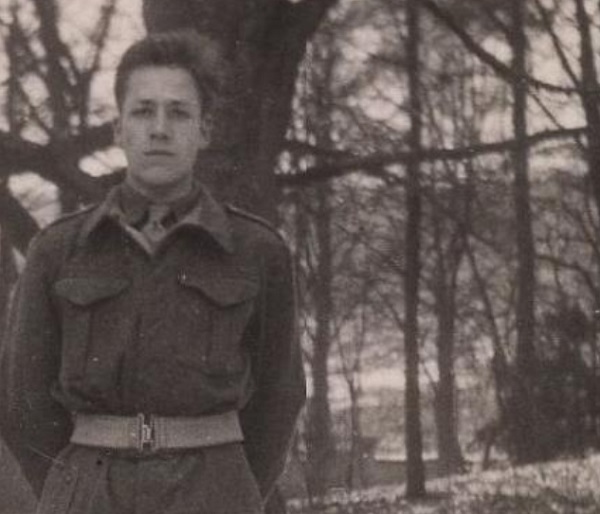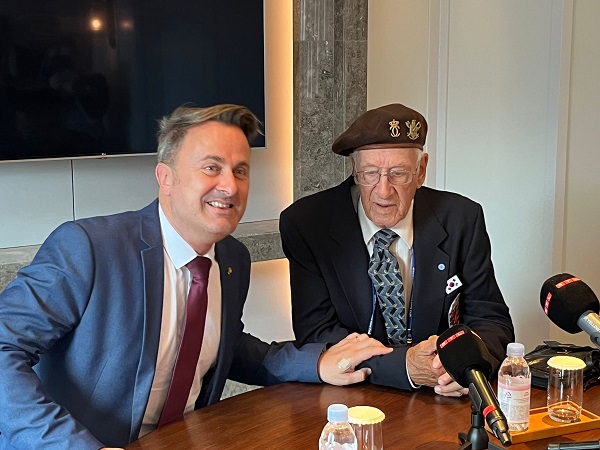 Léon Moyen;
Credit: © Moyen/MNHM
Léon Moyen;
Credit: © Moyen/MNHM
Léon Moyen is participating in this week's official visit of Luxembourg to South Korea.
He was born on 9 November 1930 in Kehmen, Luxembourg, and was eight years old when Nazi Germany invaded Luxembourg on 10 May 1939. He was thirteen years old when US troops liberated Luxembourg on 10 September 1944. He enlisted in the army at the age of sixteen and was drafted on 5 February 1948. Soon after, he was dispatched to the Rail Traffic Control in Germany in 1948 to protect coal trains which were supplying the Luxembourg steel industry. He was discharged in January 1949.
Léon rejoined the Luxembourg Army after the government's call for volunteers for Korea. After successfully completing training in the paratroopers facility in Beverloo, Belgium, he boarded the "Kamina" in Antwerp in December 1950 alongside Luxembourgish and Belgian servicemen to head out to Korea.
When he first arrived there, his main task was to do patrols. According to Léon, this job was not always dangerous. Eventually he was given a different job - to act as a "Double Crosser": this required crossing over enemy lines to do difficult commando operations. Léon saw intense combat during his time in Korea, and he was wounded on several occasions.
During a patrol on 2 May 1951, he was wounded by an enemy bullet while making contact near a South Korean police station. After five sets of first aid treatment in the field, he was transferred to two military hospitals in Japan. Despite his injury, as one of the few soldiers of the first contingent who did so, he volunteered for a second term, which was about to roll out in February 1952.
His main motivation was the camaraderie he had come to appreciate among the Korea volunteers. Promoted reserve sergeant before his second term, he then became section chief.
Back from Korea, Léon was called upon several times to take part in joint military manoeuvres. Like several other Korean veterans, Léon became disillusioned with the treatment he received in the Luxembourg army. He recalls facing derogatory behaviour in the form of lack of recognition, jealousy, unfair treatment and disguised discrimination from senior officers, dropping scathing comments about his commitment to Korea, revealed by the maroon beret he was still allowed to wear.
After the war, he chose to leave the military life, getting married and eventually emigrating in November 1955 to Toronto in Canada where he raised a family and still lives to this day. Initially, he tried to enlist in the Canadian Armed Forces; aged 26, he was refused on the grounds that he was already "too old".
A total of 85 Luxembourgish volunteers contributed to the war effort in Korea: the first contingent of 43 volunteers (22 civilians and 21 soldiers) served from September 1950 to September 1951; and the second contingent of 46 volunteers (12 civilians and 34 soldiers) served from January 1952 to January 1953.
On 30 June 1950, Joseph Bech, Luxembourg's Minister for Foreign Affairs, sent a telegram to the Secretary General of the United Nations, Trygve Lie, stating: "In acknowledging receipt of your communication of the two Security Council resolutions concerning the armed attack against the Republic of Korea, I have the honor to inform you that Luxembourg gives its approval and intends to respect and fulfill all the commitments imposed on it by the Charter".
Korean War
The Korean War was fought between North Korea and South Korea; it began on 25 June 1950 when North Korea invaded South Korea following clashes along the border and rebellions in South Korea, and it ended on 27 July 1953 when an armistice was signed, ending organised combat operations and leaving the Korean Peninsula divided much as it had been since the close of World War II at the 38th parallel.
The war claimed the lives of around five million soldiers and civilians. A total of 21 countries helped South Korea during the war, including Luxembourg.
Technically, the war never ended when the armistice was signed: both North Korea (Democratic People's Republic of Korea) and South Korea (Republic of Korea) claim to be the sole legitimate government of all of Korea.

Pictured (L-R): Luxembourg's Prime Minister Xavier Bettel and Léon Moyen during a press conference in South Korea on Tuesday 25 July 2023 (Credit: Chronicle.lu)








